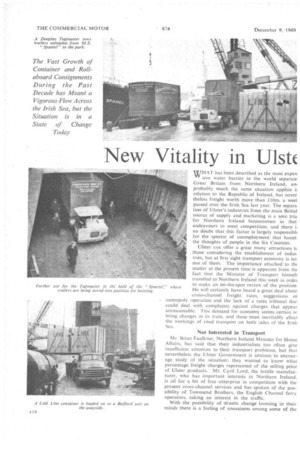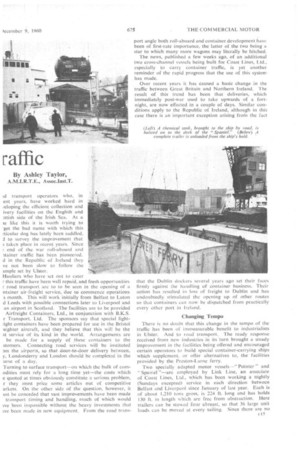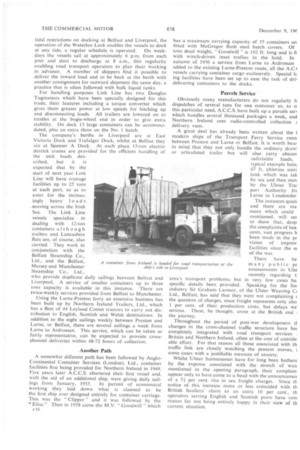New Vitality in Ulst( raffic
Page 50

Page 51

Page 52

If you've noticed an error in this article please click here to report it so we can fix it.
By Ashley Taylor,
A.M.I.R.T.E., Assoc.Inst.T. WHAT has been described as the most expen " sive water barrier in the world separate Great Britain from Northern Ireland, an, probably much the same situation applies ii relation to the Republic of Ireland, but never theless freight worth more than £10m. a weal passed over the Irish Sea last year. The separa tion of Ulster's industries from the main Britisl source of supply and marketing is a sore tria for Northern Ireland businessmen in theil endeavours to meet competition, and there no doubt that this factor is largely responsibh for the spectre of unemployment that haunt the thoughts of people in the Six Counties.
Ulster can offer a great many attractions tc those considering the establishment of indus. tries, but at first sight transport economy is no one of them. The importance attached to thc matter at the present time is apparent from flu fact that the Minister of Transport himself travelled to Northern Ireland this week in ordei to make an on-the-spot review of the position He will certainly have heard a great deal about cross-channel freight rates, suggestions of monopoly operation and the lack of a rates tribunal that could deal with complaints against charges that appear unreasonable. This demand for economy seems certain to bring changes in its train, and these must inevitably affect the workings of road transport on both sides of the Irish Sea.
Not Interested in Transport
Mr. Brian Faulkner, Northern Ireland Minister for Home Affairs, has said that their industrialists too often give insufficient attention to their transport problems, but that nevertheless the Ulster Government is anxious to encourage study of the situation; they wanted to know what percentage freight charges represented of the selling price of Ulster products. Mr. Cyril Lord, the textile manufacturer, who has important interests in Northern Ireland, is all for a bit of free enterprise in competition with the present cross-channel services and has spoken of the possibility of Townsend Brothers, the English Channel ferry operators, taking an interest in the traffic.
With the possibility of drastic change looming in their minds there is a feeling of uneasiness among some of the
id transport operators who, in ent years, have worked hard in (eloping the efficient collection and ivery facilities on the English and ntish side of the Irish Sea. At a le like this it is worth trying to .get the bad name with which this rticular dog has lately been saddled, I to survey the improvement that taken place in recent years. Since
end of the war roll-aboard and itainer traffic has been pioneered. (1 in the Republic of Ireland they ye not been slow to follow the ample set by Ulster.
Hauliers who have set out to cater r this traffic have been well repaid, and fresh opportunities r road transport are to to be seen in the opening of a ntainer air-freight service, due to commence operations s month. This will work initially from Belfast to Luton
d Leeds with possible connections later to Liverpool and an airport in Scotland. The facilities are to be provided Airfreight Containers, Ltd., in conjunction with B.K.S. r Transport, Ltd. The sponsors say that special lightight containers have been prepared for use in the Bristol .eighter aircraft, and they believe that this will be the St service of its kind in the world. Arrangements are be made for a supply of ;these containers to the storners. Connecting road services will be instituted 3rn the airports, so that door-to-door delivery between, y, Londonderry and London should be completed in the urse of a day.
Turning to surface transport—on which the bulk of cornodities must rely for a long time yet—the costs which e quoted at times obviously constitute a serious problem, r they must price some articles out of competitive arkets. On the other side of the question, however, it ust be conceded that vast improvements have been made transport timing and handling, much of which would tve been impossible without the heavy investments that tve been made in new equipment. From the road trans that the Dublin dockers several years ago set their faces firmly against the handling of container business. Their action has resulted in loss of freight to Dublin and has undoubtedly stimulated the opening up of other routes so that containers can now be dispatched from practically every other port in Ireland.
Changing Tempo
There is no doubt that this change in the tempo of the traffic has been of immeasurable benefit to industrialists in Ulster. And to road transport.. The ready response received from new industries in its turn brought a steady improvement in the facilities being offered and encouraged certain operators to build special container-carrying ships which supplement, or offer alternatives to, the facilities provided by the Preston-Larne ferry.
Two specially adapted motor vessels—" Pointer" and "Spaniel "—are employed by Link Line, an associate of Coast Lines, Ltd., which has been working a nightly (Sundays excepted) service in each direction between Belfast and Liverpool since January of last year. Each is of about 1,210 tons gross, is 224 ft. long and has holds 130 ft. in length which are free from obstruction. Here trailers can be stowed four abreast, so that 36 large unit loads can be moved at every sailing. Since there are no
A container from Ireland is loaded
ship's side in tidal restrictions on docking at Belfast and Liverpool, the operation of the Waterloo Lock enables the vessels to dock
at any tide, a regular schedule is operated. On weekdays the vessels sail at approximately 6 p.m. from each port and start to discharge at 8 a.m., this regularity enabling road transport operators to plan their working in advance. A number of shippers find it possible to deliver the inward load and to be back at the berth with another consignment for outward shipment the same day, a practice that is often followed with bulk liquid tanks.
For handling purposes Link Line has two Douglas Tugmasters which have been specially designed for this trade, their features including a torque converter which gives them greater power at low speeds for hitching up and disconnecting loads. All trailers are lowered on to trestles at the bogie-wheel end in order to give extra stability. On deck 13 large containers can be accommodated, plus an extra three on the No. 1 hatch.
The company's berths in Liverpool are at East Victoria Dock and Trafalgar Dock, whilst at Belfast they are at Spenser A Dock. At each place 15-ton electric derrick cranes are provided for the efficient handling of the unit loads des cribed, but it is expected that by the start of next year Link Line will have cranage facilities up to 25 tons at each port, so as to• cater for the increasingly heavy loads . moving across the Irish Sea. The Link Line vessels specialize in dealing with 12-ton containers although trailers and Lancashire flats are, of course, also carried. They work in conjunction with the Belfast Steamship Co., Ltd., and the Belfast, Mersey and Manchester Steamship Co., Ltd., who provide duplicate daily sailings between Belfast and Liverpool. A service of smaller containers up to three tons capacity is available in this instance. There are twice-weekly services provided from Belfast to Manchester.
Using the Larne-Preston ferry an extensive business has been built up by Northern Ireland Trailers, Ltd., which has a fleet of 44 Leyland Comet tractors to carry out distribution to English, Scottish and Welsh destinations, In addition to the eight sailings weekly between Preston and Larne, or Belfast, there are several sailings a week from Larne to ArdrOssan. This service, which can be taken as fairly representative, can be expected to provide crosschannel deliveries within 48-72 hours of collection,
Another Path
A somewhat different path has been followed by AngloContinental Container Services (London), Ltd., container facilities first being provided for Northern Ireland in 1949. Five years later A.C.C.S. chartered their first vessel and, with the aid of an additional ship, were giving daily sail ings from January, 1955. In pursuit of economical working they laid down what is claimed to be the first ship ever designed entirely for container carriage. This was the " Clipper " and it was followed by the " Elisa." Then in 1958 came the M.V. " Goodwill " which c16
has a maximum carrying capacity of 55 containers an fitted with McGregor flush steel hatch covers. Of tons dead weight, "Goodwill" is 192 ft. long and is fi with winch-driven inset trollies in the hold. In autumn of 1956 a service from Larne to Ardrossan added to the existing Larne-Preston route, all the A.C. vessels carrying container cargo exclusively. Special lc ing facilities have been set up to ease the task of dri, delivering containers to the docks.
Parcels Service Obviously many manufacturers do not regularly h dispatches of several tons for one customer so, to IT this particular need, A.C.C.S. have built up a parcels set') which handles several thousand packages a week, and Northern Ireland uses radio-controlled collection delivery vans.
A great deal has already been written about the I modern ships of the Transport Ferry Service runn between Preston and Larne or Belfast. It is worth bear in mind that they not only handle the ordinary drawl or articulated trailer but will also carry abnorr indivisible loads, typical example beim 67 ft. chlorine stork tank which was tak by sea and then mov by the Ulster Trai port Authority frc Larne to Londonder
The instances quoti and there are ma more which could mentioned, will ser to show that, desp the complaints of hea costs, vast progress h been made in the pr vision of improV, facilities since the et of the war.
There have be
for road transportation at the many public pr Liverpool. nouncements in Ulst
recently regarding ti area's transport problems; but in very few cases ha specific details been provided. Speaking for the lim industry Sir Graham Larmor, of the Ulster Weaving Cc Ltd., Belfast, has said that they were not complaining the question of charges, since freight represents only abo 1 per cent. of their production costs, but delays we serious. These, he thought, arose at the British end the joUrney.
Throughout the period of post-war development ti changes in the cross-channel traffic structure have bec completely integrated with road transport services Britain and Northern Ireland, often at the cost of conside able effort. For that reason all those associated with th traffic link are closely watching the present moves, i some cases with a justifiable measure of anxiety.
Whilst Ulster businessmen have for long been bothere by the expense associated with the stretch of watt mentioned in the opening paragraph, their complain appear only to have come to a head with the announcemer of a 71 per cent, rise in sea freight charges. Since th notice of this increase more or less coincided with th British hauliers' claim to an extra 10 per cent., th operators serving English and Scottish ports have som reason for not being entirely happy in their view of th current situation.
























































































































